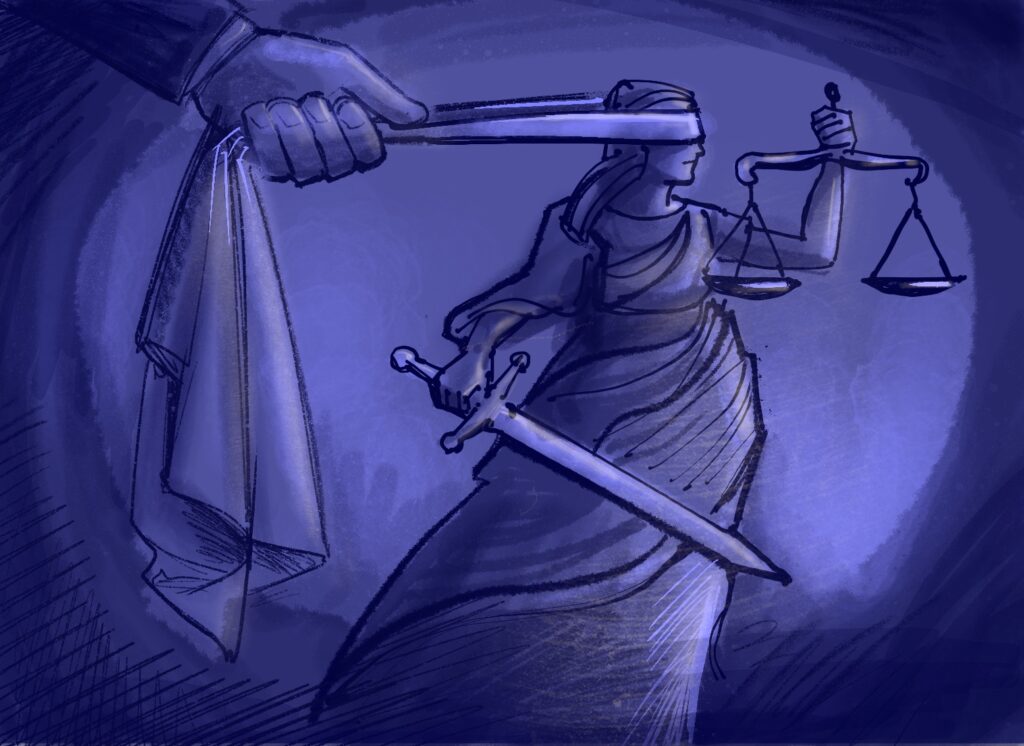Updated Dec. 22: A state judge ruled Dec. 20 that Missouri’s strict law redacting the names of witnesses and victims from court records violated both the First Amendment of the U.S. Constitution and the Open Courts provision of the Missouri Constitution.
Judge Aaron J. Martin, ruling out of Cole County Circuit Court, said a “plain reading” of the words of the 2023 law required the redaction of all witness and victim names from court records and was therefore unconstitutional and “unenforceable.”
“This isn’t just a win for journalists and lawyers. This is a win for every Missourian and every person interested in government transparency,” said Chad Mahoney, the President and CEO of the Missouri Broadcasters Association.
Mark Sableman, the St. Louis lawyer who argued against the law in court, said the court’s ruling “restores Missouri court filings to the way they have always been for centuries, until last year – transparent and open to the public, except for those unusual situations where there is a proven need for confidentiality. This ruling reopens our window to the courthouse, so that journalists, citizens, and researchers can again fully see and understand what our courts are doing.”
The Gateway Journalism Review provided the most extensive press coverage of the broad redactions required by the law; legal experts described the redaction requirements – now struck down – as the most extensive in the country.
Below is the story earlier this month that described the court hearing on the law:
Media lawyers told a state court judge this month that the Missouri law requiring redactions of the names of witnesses and victims from court records violated both the state and federal constitutions.
Attorney General Andrew Bailey’s office replied that the law does not require as many redactions as the media lawyers say and therefore does not violate the constitutions. Bailey’s office conceded, however, that if the law is as broad as the media says, it could be unconstitutional.
Mark Sableman, representing the Missouri Broadcasters Association and Gray Local Media, told the judge that the plain words of the law could not reasonably be interpreted any other way than prohibiting the use of names of witnesses and victims in public court records. Most Missouri courts have interpreted it in that broad fashion, leading to widespread redactions.
Although the Attorney General is not contesting the law’s likely unconstitutionality under the prevailing interpretation, Sableman told the court that because our constitutions are “the elephants of the law,” he felt it was necessary to address “the elephants in the room.” He explained the authorities under both the federal and state constitutions that mandated broad public access to court records, and thereby prohibited blanket redactions not tied to specific confidentiality needs.
Judge Aaron J. Martin, sitting in the Cole County Circuit Court, took the case under advisement. He is expected to rule early next year.
The Gateway Journalism Review reported a year ago that legal experts around the country believed the Missouri law to be the most stringent redaction law in the nation.
Sableman, a media lawyer at Thompson Coburn, said that the Missouri Press-Bar Commission raised concerns with the law to the Missouri Supreme Court last year. In an article last year, Sableman said that the law made Missouri into the “State of Unnamed Persons.”
Paul G. Cassell, a former federal judge and victims rights advocate, told GJR a year ago that he didn’t know of any law like it in the nation. He wrote in an email, “I am not aware of any jurisdiction mandating such a broad prohibition on use of names. It does seem difficult to justify application of such a rule without narrowing it to circumstances where good reason may well exist for privacy (such as juveniles and sex assault cases).”
Eugene Volokh, a nationally known libertarian legal commentator, called the law “a very serious problem” under the headline “Missouri ‘Stealth Statute’ Requires Redaction of All Witness and Victim Names” in Court Records.”
Charles Mahoney, president/CEO of the Missouri Broadcasters, said he didn’t know of another state with such a broad redaction law. He said his organization is concerned the law could impede journalists’ ability to “report the full truth.”
The Missouri Broadcasters joined appellate lawyers and journalists last May in asking the court to block enforcement of the law because it violated the state and federal constitutions and was passed improperly.

Last minute passage
The redaction law passed at the end of the 2023 legislative session when the broad language was added to an omnibus bill covering many matters. No hearings were held on the language of the redaction provisions and legislative research found no legislative record on how it was added to the bill.
The lawsuit against the law said its redactions extended to a host of officials: law enforcement officers; public officials; corporate employees and officers; public and private custodians of records; expert witnesses; doctors, nurses, social workers, and pharmacists; attorneys, engineers, and other professionals who become witnesses based on their professional responsibilities; complaining witnesses, who voluntarily made complaints to
authorities; prisoners; court reporters and court clerks; prosecuting attorneys and defense attorneys; persons whose names appear in documents, at least if the document reports in some way their observations or actions.
Challenging the law along with Sableman and the Missouri Broadcasters is David Roland, director of litigation at the libertarian Freedom Center of Missouri. He told a group of lawyers last week that, “Historically speaking, the judiciary has been the most transparent form of government. Proceedings are supposed to take place in public.”
The traditional openness of courts is an outgrowth, he said, of the reaction to the abuses of the Star Chambers of English history where closed courts tortured defendants and witnesses.
Often court records are the best place to find reliable history, Roland said. Missouri legal decisions tell the stories of the likes of Daniel Boone, Jesse James and George Caleb Bingham, he added.
The attorney general’s office argued in the court hearing that the redaction law does not apply to all proceedings but only to “names of witnesses and victims …when those names are made confidential by court order or other law.”
Constitution protects openness
In the court hearing, Sableman pointed to both federal and state court decisions protecting the openness of court records.
A string of U.S. Supreme Court decisions beginning in the the 1980s protected the press’s access to courtrooms and court records based on the First Amendment. The Missouri constitutional provision rests on the long courtroom tradition of open courts.
The lawyers challenging the law pointed out that Missouri appeals courts began redacting all names of witnesses and victims after passage of the redaction law.
The Office of Legal Ethics has issued conflicting decisions on how the redaction law should be implemented by lawyers. The office said that when a lawyer has a good faith belief that all names should be redacted, he is ethically bound to redact them, require associates to also redact the names and to report any lawyer who fails to make redactions.
Opponents of the law argued that two decisions in recent months strengthen their challenge. A federal appeals court ruled that a Hawaii law that redacted a whole category of information was unconstitutional because courts can’t make categorical closures of information.
Also, the Ohio Supreme Court interpreted a state Open Courts clause in its constitution – a provision similar to Missouri’s – to bar redaction of information a juvenile case.
The challengers to the law also say the Missouri Legislature violated the state constitution by putting the redaction law in an omnibus measure with many subjects instead of one and by not following the rules on how the legislature can change court processes. That latter error, Roland said, is a violation of the separation of powers.
William H. Freivogel, publisher of GJR, is one of the plaintiffs in the lawsuit against the redaction law. GJR first disclosed the reach of the redaction law.
- News analysis: Trump’s handling of Minnesota investigations defies time-tested procedures and looks like a ‘cover-up in plain sight’
- St. Louis KDHX-FM radio disappears, but alums stage CRSTL comeback
- Remembrance: During a five-decade career Terry Ganey always got the truth and ‘wouldn’t take no for an answer’
- Hazelwood censorship case looms over student journalists
- As WashU restricts protest and expression, critics see an inconsistent standard
